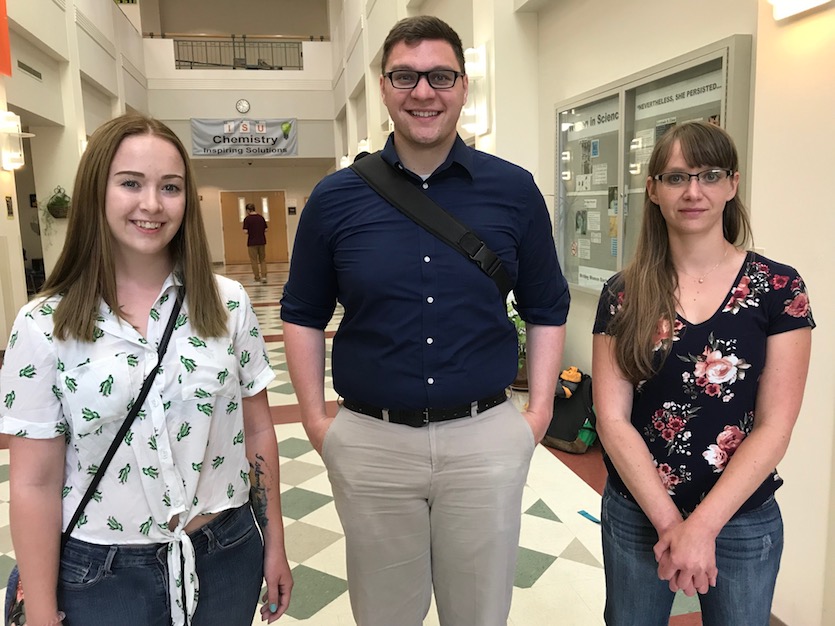INBRE program at ISU gives taste of biomedical research to budding researchers
May 29, 2018

POCATELLO –Undergraduate students have been paired with their mentors to begin an intensive summer working full-time as biomedical researchers at Idaho State University as part of the Idea Network of Biomedical Research Excellence (INBRE) Summer Fellowship program.
“They are expected to work full time and they are expected to essentially be graduate students during the 10-week period,” said Mark Austin, ISU INBRE program director and professor of biological sciences. “They may be working late hours or on weekends. Whatever the research or experiments dictate, those are the expectations.”
There are 13 ISU undergraduates from throughout the state and one from Brigham Young University-Idaho participating in the program this summer. The primary goal of the Idaho INBRE Program is to provide biomedical research opportunities for Idaho undergraduate students. The program also helps promote health research careers.
“Really, this program is a pipeline for getting students into biomedical research careers,” Austin said.
They’ll be working in a variety of laboratories on campus, including laboratories in the departments of biological sciences, chemistry and psychology and in the College of Pharmacy.
The participating students receive a $6,000 stipend for the summer and are required to present their research findings at an INBRE conference in Moscow at the session’s end, July 30-Aug. 1.
“It is a wonderful opportunity for students to have a research experience during a time when they actually devote a significant amount of time actually doing research rather during the school year, where they’re divided into many different responsibilities, including academic activities,” said Josh Pak, an ISU chemistry professor who is participating as a mentor to two students working in his lab this summer. “It helps them learn what it is like to be a scientist. It’s incredibly valuable for students because faculty engage with younger students at an earlier time and perhaps have a bigger influence or impact in their choice of career.”
Jennie Nelson, a biology major from Boise, said the INBRE program could help her clarify her career path. She will be working is in Jason Pilarski’s laboratory that studies cellular mechanisms that control and modulate breathing rhythms in the brain stem. Pilarski is an associate professor of neurophysiology in the departments of biological and dental sciences.
“It is very hard to find any other kind of opportunity like this that can actually show you what doing research full time is like,” Nelson said, “And since I want to do research for the rest of my life, this is great opportunity to figure out if that is what a really want to do.”
For Alleyna Martes, a psychology major from Nampa, the INBRE fellowship will allow her to further develop her research skills. She has spent the last nine months working in the lab of Michele Brumley, associate professor and chair of the ISU Department of Psychology and the 2018 ISU Distinguished Researcher.
“It is just a really good opportunity to expand my research skills and further my research itself,” Martes said. “It’s a good chance to get me working on my own project and further my abilities.”
In Brumley’s lab, Martes will be studying the effects of neonatal spinal cord transections and opioids on neurobehavioral function and sensory thresholds
For participant Shawn Plyler INBRE will be more of an introduction to research. Plyler, a native of Silverdale, Washington who is a Brigham Young University-Idaho student, will be working in a pharmaceutical laboratory in the College of Pharmacy doing “pharmaceutical gene editing and pharmaceutical approaches to trying to find the mechanism behind osteosarcomas,” which are malignant tumors of bone.
“I’ve done a little research, but this is going to be the door, in essence, of me getting into further research and getting to understand the human body a little bit more,” said Plyler, who hopes to become a physician. “When I was choosing my research mentor I was trying to find something that had to do with pathophysiology, or pathology, something related to the human body. I really want to grow and expand my mind as far one specific research development goes.”
Austin touted the benefits of the program at the students’ orientation.
“This fellowship intended to be key step in your career development,” Austin said. “There is potential for you to make significant impact in scientific discovery that may lead to a greater understanding of human pathophysiology and disorders and their treatments.”
The INBRE Program is funded by the National Institutes of Health and the National Institute of General Medical Sciences Institutional Development Award (Grant # P20GM103408).
